Revelations of forgotten voices
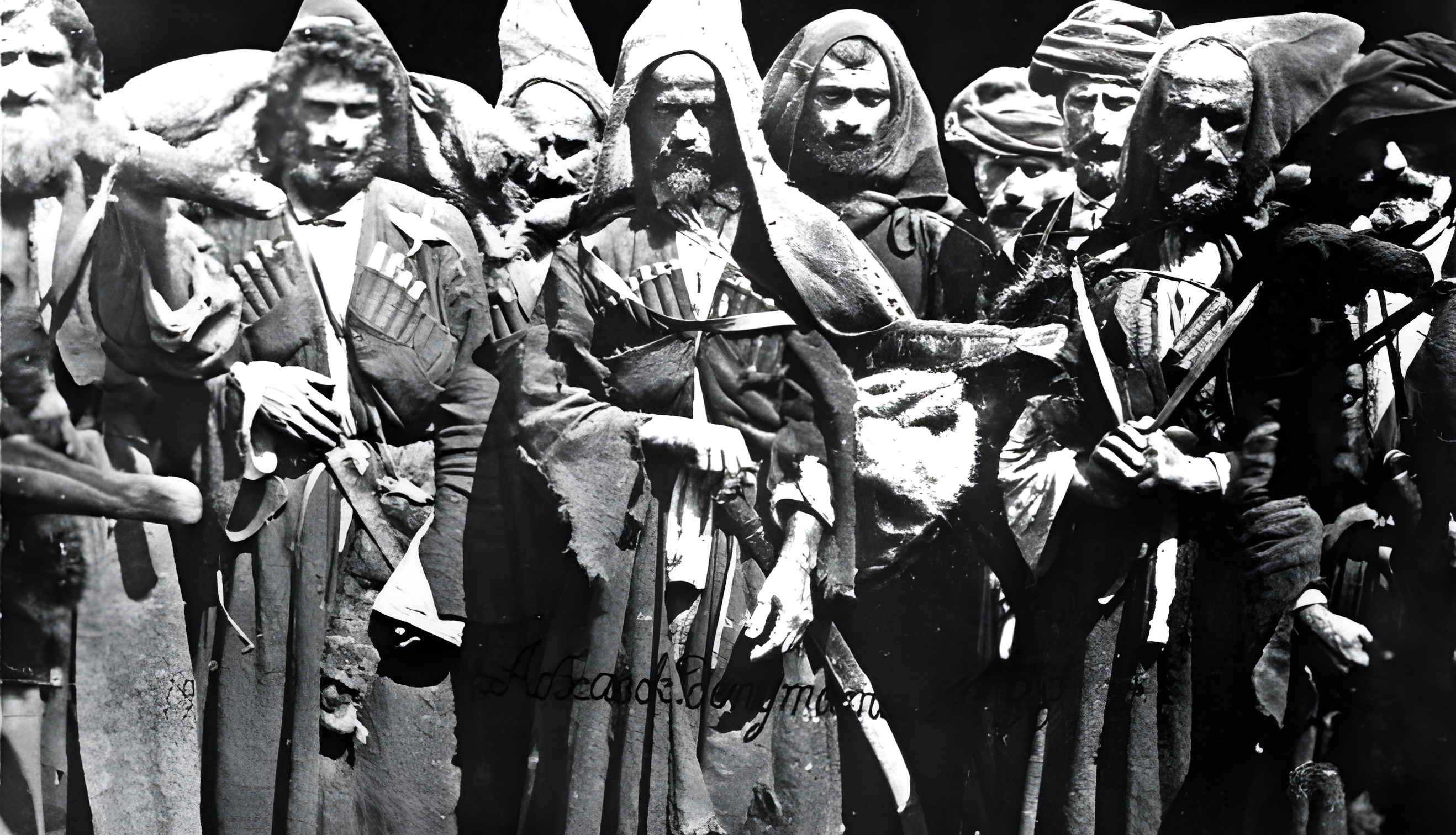
Abkhazians who took part in the 1866 Lykhny uprising. Photo by D. I. Yermakov (1867)

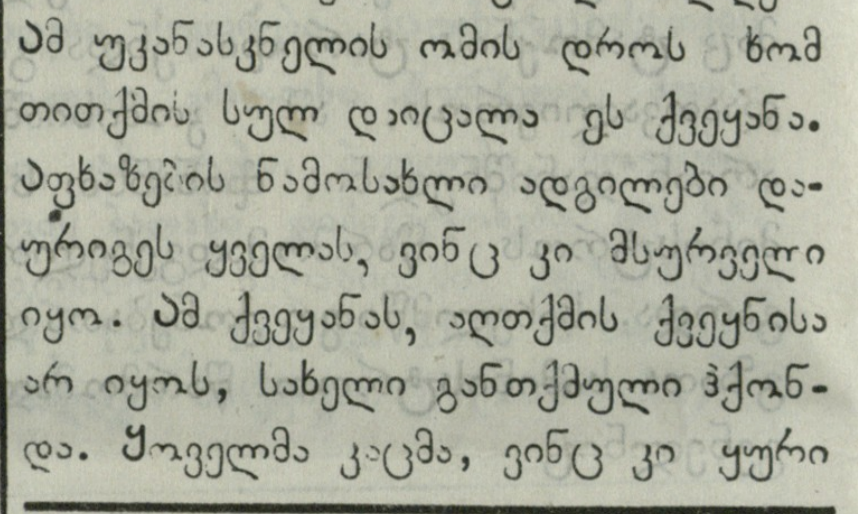
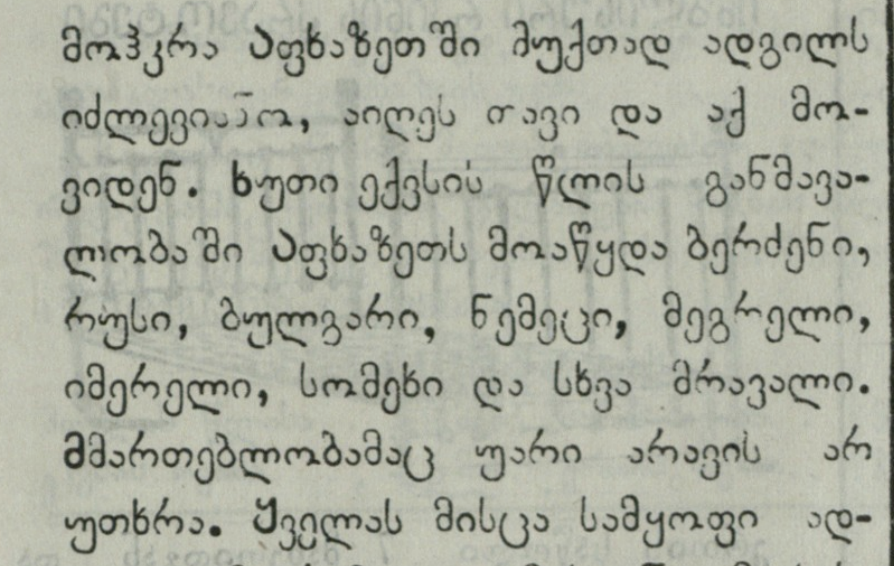
' Abkhazia , October 10 ', A. Dzhugheli (Gadaghmeli)
'... Abkhazia , as the very name of the place suggests, belonged and belongs to the Abkhazians ... In this last war (1877-1878 -- Ed.), this country was almost completely emptied. The vacated lands of the Abkhazians were distributed among all who desired them. This country, as a country of the covenant, had a famous name. Everyone who had vaguely heard that in Abkhazia land was being divided and given away upped and moved here . Within 5-6 years Greeks, Russians, Bulgarians, Germans, Mingrelians, Imeretians, Armenians, etc. flooded into Abkhazia. And the authorities refused no-one.'
Newspaper "Droeba”, 1883, N 216.
***
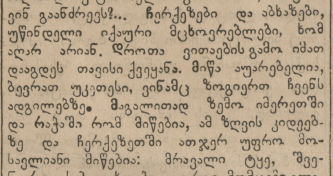
"The Circassians and Abkhazians, the former inhabitants there, are, as you know, no longer [there]. They abandoned their country as a result of the state of the times. The land is immeasurable and far better than some of our places. Take for example the soils in Upper Immereti(a) and Rach’a, the soils on the fringes of this sea [sc. the Black Sea] and in Circassia are 10-times more productive in terms of yield:…"
Newspaper “Droeba”, Tiflis, 1873. № 399, p.3 The article: shik'rik'i (Courier)
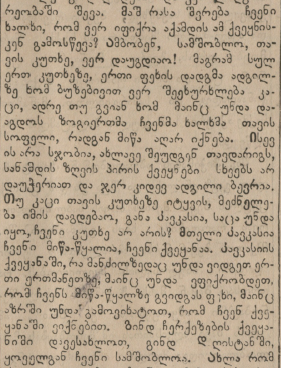
"And so what are our folk doing, having been unable hitherto to conceive of moving in the direction of this country? They talk of their inability to abandon their homeland, their own region! But setting a foot all in one region surely won’t lead to men swarming like flies in the place — after all, sooner or later some of our people are nevertheless going to have to abandon their own rural area, since there will no longer be land there. Again then wouldn’t it be preferable that they set about making preparation rightaway before others seize the coastal territories and while land is still plentiful? Should anyone say of his own region that he finds it difficult to abandon it, isn’t the Caucasus, wherever one may be in it, our region? The entire Caucasus is our territory, our country. In the country of the Caucasus, at whatever remove we may be standing one from another, the thought in our mind should be that our foot in planted on our territory…"
Newspaper “Droeba”, Tiflis, 1873. № 399, p.3 The article: shik'rik'i (Courier)
***

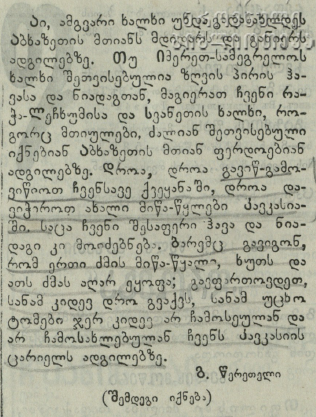
Newspaper “Droeba”, Tiflis, 1879.№ 27
Translation:
It is true, the edges of the whole of the Black Sea on the Caucasian side have been laid waste. The territory produces a multitude of rich fruits and is without equal for animal husbandry and arable cultivation, but it is only the people of Georgia-Imereti(a) and Mingrelia whom it will be profitable to settle there. In the lowland, along the sea-coast, starting from the port of Soch’i (Socha), in the whole of Abkhazia’s coastal zone and the lands of Batum-Kobuleti the folk of Imereti(a) and Mingrelia are fine — they live close to the sea, also pursue trade and are accustomed to a boggy and fever-bearing atmosphere. And so, these empty coastal areas are fit only for these people, the more so since they are today very short of land; however, it is the people of Lechkhumi, Rach’a, Ossetia and Svaneti(a) who suffer most from constraint of land. These poor wretches live insect-infested on meagre and fruitless piles of leaves, and, since they have no place to sow and plough, they come down to our towns in the valley the whole winter-spring and summer with a knapsack slung over their backs, almost working themselves to death day and night in sleepless labour.
Yes, such folk as these should be resettled into Abkhazia’s mountainous, rich and broad lands. If it’s the folk of Imereti(a)-Mingrelia who fit well with the air and soil of the coast, it’s the folk of our Racha-Lechkhumi and Svaneti(a), being mountain-dwellers, who in their stead will fit really well with the lands of Abkhazia’s moutain-slopes. It is time, high time that we move this way and that across our very own country; it’s time that we grab new territories in the Caucasus where air and soil that suits us is indeed to be found. One just has to understand that one brother’s territory won’t any longer be sufficient for five or ten brothers. Let’s spread out while we still have time, before foreign tribes arrive and take up settlement in our vacant Caucasian lands.
G. Ts’ereteli
(To be continued)
***
+ Demographic change in Abkhazia 1897–1989
+ The solitude of Abkhazia, by Douglas W. Freshfield
+ Population of Abkhazia (1886 - 2011)
+ Ethno-demographic history of Abkhazia, 1886 - 1989, by Daniel Müller
I. CHICHINADZE, telling of the operation to relocate Mingrelian families from the Zugdidi district to Abkhazia, judged this phenomenon to be one 'of the most beautiful in the new life '. I. CHICHINADZE closes his publication with the call: '... Send here more Rachans, Lechkhumians, Upper Imeretians, and Megrelians from mountain sites, and you will see that these countries will be covered more blooming villages, fruits of the land, and cattle than in the days of the Circassians and Abkhazians.'
Newspaper “Shroma”, Tiflis, 1882. № 15.
***
The article by prominent Georgian publicist I. Gogebashvili 'Who occupy Abkhazia?', published in 1877 in the newspaper “Tiflis bulletin” (27.09.1877, № 209), can be considered a programme-piece. 'This resettlement is, without a doubt, not temporary but permanent. Abkhazia will never see her sons again,' writes Gogebashvili. 'Getting down to business' the publicist talks about which Georgian tribe should occupy Abkhazia and concludes it should be the Mingrelians. ‘Overcrowding and lack of land in Mingrelia, which forces its inhabitants to leave their homeland and go to different parts of Transcaucasia to work, without a doubt, make resettlement in Abkhazia very desirable for many Mingrelians,’ Gogebashvili affirms.
Such indoctrination could not but lead to the formation at all layers of Georgian society of the firm conviction that any attempt by the Abkhazians to call this Abkhazian land must be punished in the most brutal manner. And the occupation of Abkhazia after the collapse of the Russian Empire in 1918-1921 seemed the natural result of this ideology and policy. Not doubting the correctness, Georgian activists did not hide the openly chauvinist, imperial character of their policy. The leader of the Georgian Mensheviks, Noe Zhordania, was frank: ‘The Russian tsarist government did not have the time to russify the Abkhazians, but we, as a related tribe, must georgianise the Abkhazians through our own culture." In 1918, the Mensheviks passed through Abkhazia with fire and sword. As pointed out in his famous book “On the Groundless Claim of the Georgians to the Sukhum District (Abkhazia )”, N. Vorobyov: “Free and young Georgia, before succeeding in gaining recognition for their own independence, while preaching the rights of small nations to self-determination, is making every effort to incorporate, to include in its borders the whole country [of Abkhazia] and to absorb in its entirety the Abkhazian nation, which is not at all related to the Georgian people, under a flag of the highest, most esteemed slogans of justice and self-determination; in Georgia betrayal, violence and robbery are on display to the widest extent."
Op. cit., Rostov-on-Don, 1919
***
‘The Russian tsarist government did not have the time to Russify the Abkhazians, but we, as a related tribe, must Georgianise the Abkhazians through our own culture.'
- Noe Zhordania, the leader of the Georgian Mensheviks (1918-1921).
***
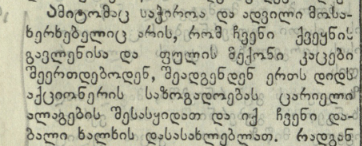
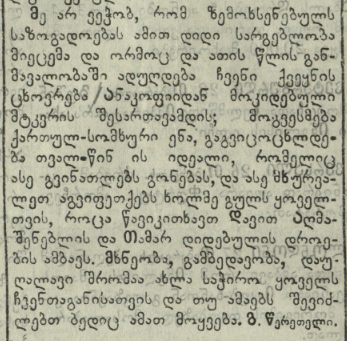
Newspaper “Droeba”, Tiflis, 1879. № 47. pp.1-2
Translation:
And for this reason it is necessary (and it is also easy to arrange) that men with money and under the influence of our country come together and create a large stock-company in order to buy up the empty lands and settle there our lower-order people.
...
I do not doubt that the aforementioned company will by this means achieve great success and that within 50 years the life of our country will come to the boil from Anak’opia [viz. New Athos in Abkhazia — trans.] to the estuary of the Mt’k’vari [aka River Kura — trans.]; it will be the Georgian-Armenian language(s) that we hear, and before our eyes will come to life that ideal of ours which so lights up our minds and so warmly always sets our hearts beating whenever we read reports of the times of David the Builder [1073-1125 — trans.] and Tamar the Glorious [1184-1213 — trans.]. Courage, boldness and tireless labour are now essential for each and every one of us, and, if we prove capable of these measures, good fortune too will follow them.
G. Ts’ereteli
***
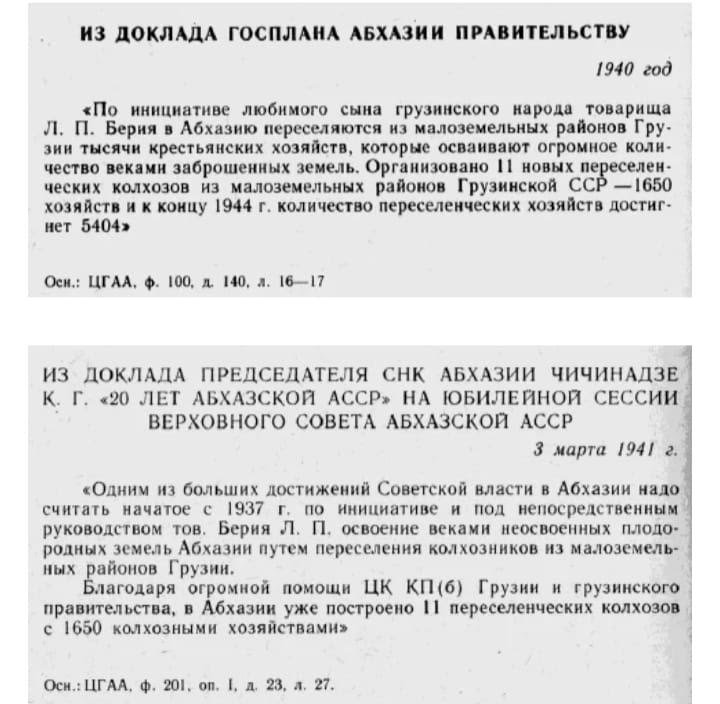
Translation:
***